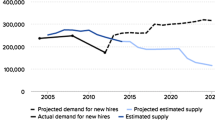Abstract
Teaching might not be the most popular profession in the world but it is undoubtedly the most populated. There are indeed some 57 million teachers in the world, about two thirds of whom work in the developing world. Over the years, the teacher and the teaching profession in the Philippines have been confronted by various issues and concerns that are directly or indirectly affecting them. The dynamics of the profession offers a fertile ground for debates and discussions. This paper presents a panoramic view of teacher education in the Philippines in the light of the following contextual variables: milieu, matter, materials, method and mastery.
Similar content being viewed by others
References
Bautista K. (2003). Overhauling RP Education. Magazine MIND: Your Guide to Lifelong Learning. VIP Communications Ventures, Inc., Premier Issue, pp. 12–16.
J. Bernas (2002) The 1987 Philippine Constitution: A Review Primer Rex Bookstore Manila
Y. Cheng K. Chow (2002) ArticleTitleSystems of teacher Education: International Perspectives and Future Developments Asia-Pacific Journal of Teacher Education and Development 5 IssueID2 1–28
Y.C. Cheng T. Townsend (2000) Educational Change and Development in the Asia-Pacific Region: Trends and Issues T. Townsend Y.C. Cheng (Eds) Educational Change and Development in the Asia-Pacific Region: Challenges for the Future. Swets and Zeitlinger The Netherlands 317–344
Y. Cheng K. Ng M. Mok (2002) ArticleTitleEconomic considerations in education policymaking: A simplified framework The International Journal of Educational Management 16 IssueID1 18 Occurrence Handle10.1108/09513540210415514
J. Cogan (2002) ArticleTitleSummary and conclusions: A look to the future for teacher education in the United States of America Asia-Pacific Journal of Teacher Education and Development 5 IssueID2 335–342
Collaborative Research on Laboratory Schools (CORELS, 1999). Redefinition of Laboratory Schools as Support Structures for Teacher Education Programs. Conducted by The Philippine Normal University Research Center for the Commission on Higher Education, Vol. 1.
Commission on Higher Education (CHED, 1997). Teacher Education Plan.
Commission on Higher Education (CHED, 1999). Revised Policies and Standards for Undergraduate Teacher Education Curriculum. CHED Memorandum Order No. 30.
Congressional Commission on Education (EDCOM, 1993). Teacher Welfare, Compensation and Benefits, Vol. 2. Areas of Concern in Philippine Education, Book One. Making Education Work. Quezon City, Philippines: Congressional Oversight Committee on Education.
P. Dalin V.D. Rust (1996) Towards Schooling for the 21st Century Cassell New York
Department of Budget and Management (DBM). Education Budget, 2002–2004. Retrieved July 8, 2003 from http://www.dbm.gov.ph/.
Department of Education (n.d.). Fact Sheet: Basic Education Statistics. Retrieved Aug. 8, 2003 from http://www.deped.gov.ph/.
Education Commission (EDCOM, 1991). Area Report: Education and Manpower.
H. Gardner (1999) disciplined mind: What all students should understand Simon and Schuster New York
General, H. (2004). Questions of policies: Education system’s bright sides. Philippine Daily Inquirer, October 20.
Gonzalez, A. FSC (2000). Education in the Philippines in the Third Millennium. Delivered at the first National Congress of the Religious of the Virgin Mary Educational Association of the Philippines on October 19–21, 2000 at the Montebello Via Hotel, Banilad, Cebu City. Educator’s Journal, 20(8).
A. Gonzalez B. Sibayan (1988) Evaluating Bilingual Education in the Philippines (1974–1985) Linguistic Society of the Philippines Manila
Ibe, M. (1991). Teacher Education: Its Implications to Basic Education. Retrieved Jan. 21, 2003 from. http://www.adnu.edu.ph.
H. Lagrada (2003) ArticleTitleTeacher education institutions/organizations: How can they work together? Educator’s Journal 22 IssueID10 6–10
S. Laird (1988) ArticleTitleReforming “Woman’s True Profession”: A case for “Feminist Pedagogy” in Teacher Education? Harvard Educational Review 58 IssueID4 19–28
J. Magpantay (1995) Streamlining the Science and Technology Sector for the Country’s Development Goals Philippine Institute for Development Studies Makati City, Philippines
Parkay, F. W. & Stanford, B. H. (1998). Becoming a Teacher (4th Ed). Allyn and Bacon, Co., 45, 50.
Philippines Education Sector Study. (1998). Philippine Education for the 21st Century. Technical Background Paper No. 3: Higher Education in the Philippines, 70.
Promkasetrin, P. (1990). Comparative Overview of 15 Countries. Vol. 1. Innovations in Teacher Education: Progress and Achievement. UNESCO-PROAP, Bangkok.
Savellano J. (1999). Teacher Education in the Philippines: Its Historical Perspectives, An Assessment and Prospects.
Teacher Education Council, A Masterplan for Teacher Education. (1995–2005), 1995, 4.
Teacher Education Council, A Masterplan for Teacher Education. (1998-2008).
Author information
Authors and Affiliations
Corresponding author
Rights and permissions
About this article
Cite this article
Agarao-Fernandez, E., Guzman, A.B.d. Contextual Realities of Teacher Education in the Philippines. Educ Res Policy Prac 4, 129–144 (2005). https://doi.org/10.1007/s10671-005-3360-7
Issue Date:
DOI: https://doi.org/10.1007/s10671-005-3360-7




